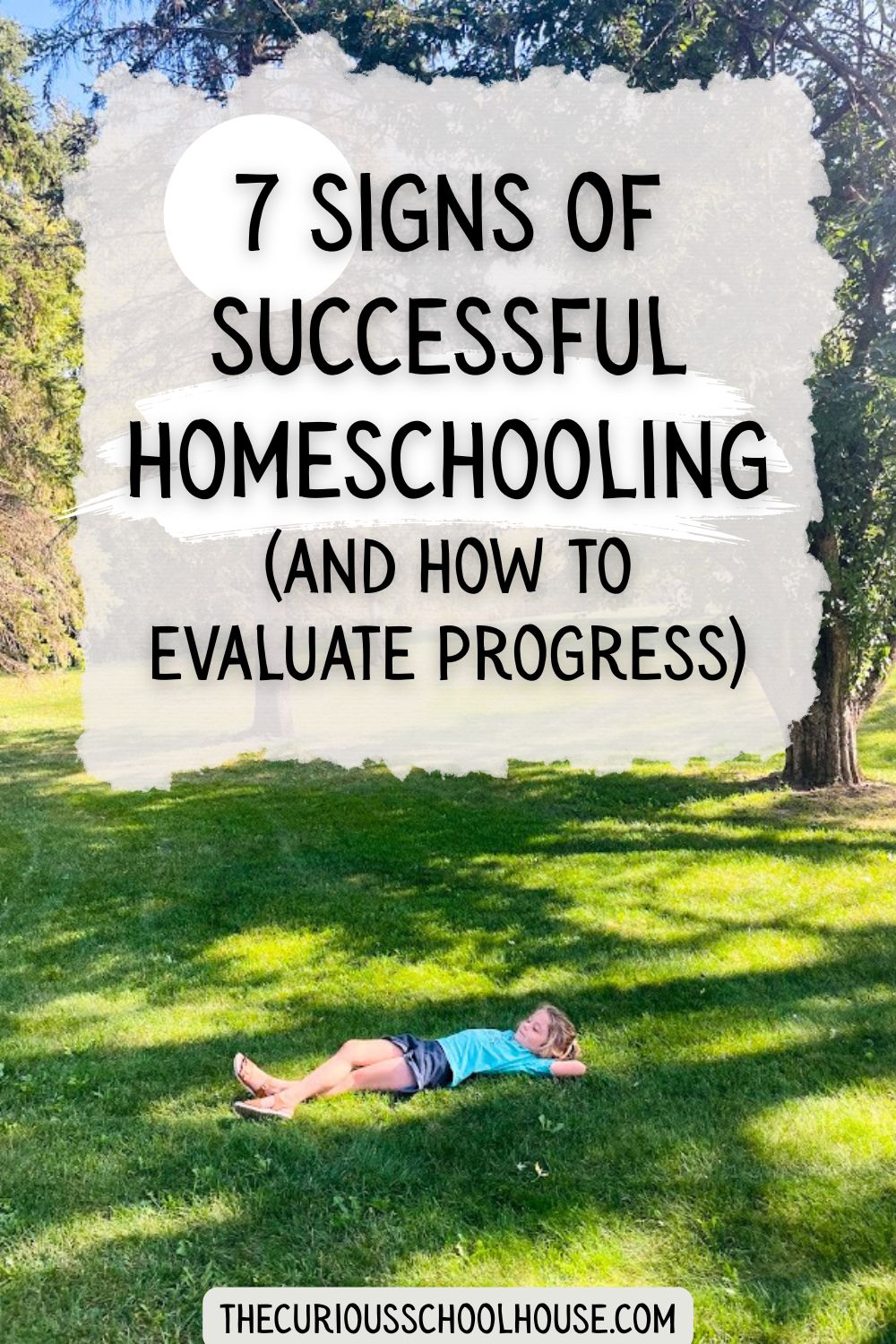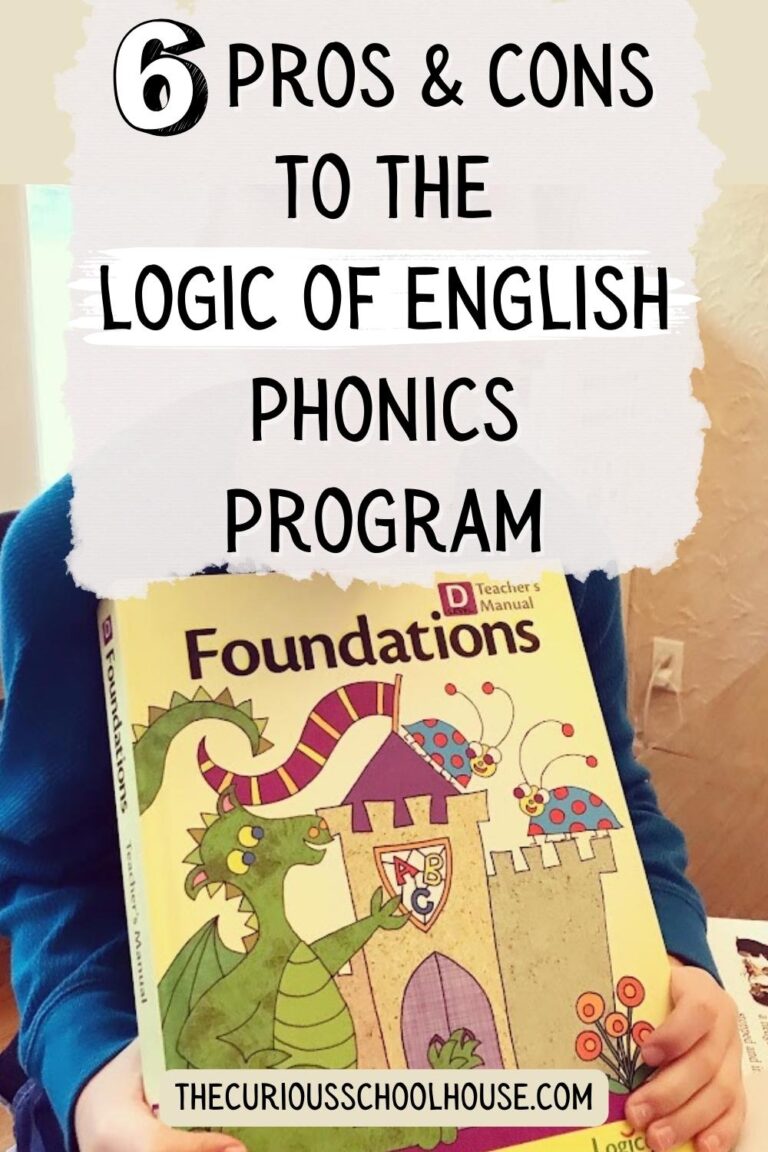7 Signs of Successful Homeschooling (& how to evaluate progress)
This post shares practical ways to tell if our homeschool is on track, and signs of successful homeschooling. We’ll also discuss what to do if you DON’T see any signs of of success, or if you feel like your homeschool has gotten off track!
As homeschool moms, we often wonder about our homeschools. “Am I doing enough? Are my kids at grade level? Do they have significant gaps in their education? Will they be prepared for the future?”
These questions are normal – but maybe we’ve been conditioned to measure success by the wrong standards. Success in the public schools looks like a child who gets good grades, who scores well on tests, and who remembers to complete his homework.
But in our homeschools, we probably don’t give grades, we might not use tests, and there is no homework (alternatively, you could say it’s all homework)! So how are we supposed to know how our children are doing?
I’ve been thinking a lot lately about what “successful homeschooling” looks like. This idea of success is an elusive beast, one that dances just outside our field of vision. We homeschool moms worry and fret about whether or not our homeschool is “working,” if our children are “successful,” and the reason this continues to plague us is because there is no one definition of success.
It looks different for every child – and for every grownup!
If you ask 100 adults what it means to have a successful life, you’ll probably get 100 different answers.
And yet, the public school system reduces this impossibly complicated idea down to the most simplistic of numbers. Ninety percent or higher? Yes, you’re successful. End of story.
In our homeschools, we lack the simple assurance of having a report card/a test result/a number of any sort telling us whether or not our child is succeeding. And this, I would argue, is a very good thing.
Why? Because these numbers, though they tell parents something about their child, are not the end of the story – and when we don’t have them, perhaps we can be forced to take a harder, closer, more well-rounded look at our child and how they are doing.
Are there straight-A students who have utterly failed at real life? Yes.
Are there C/D students who have succeeded tremendously at real life? Yes.
The assurance that parents of conventionally-schooled children get – that assurance that comes from the report cards and the grades, the one that we homeschool moms wish we had – this is a false and fleeting assurance.
Yes, it means something – but not certainly not everything, and we have no cause to envy it.
No parent (in any schooling method) truly knows whether or not their child will succeed in the future. We are all simply doing the best we can do, day by day, planting seeds of love and praying for a harvest. Only time will tell what grows in our garden.

7 Practical Signs of Successful Homeschooling
Of course, even if we can’t get rock-solid assurance that our kids will be fine (no parent gets that, by the way), it’s good have some way of telling whether or not we’re on the right track – before our child graduates from high school and moves out!
Here are a few things to watch for as we go through our homeschool days – some practical signs of successful homeschooling that can gently nudge us in the right direction.
- CURIOSITY. Do your kids ask questions, wonder, and explore the world around them? This is not just a cute thing that preschoolers do, but one of your child’s most valuable assets. Nurture this and encourage their curiosity! Kids who stop being curious stop caring, and when they stop caring, they stop learning.
- PERSONAL GROWTH. This could be related to their habits or chores – maybe they are more consistent, or more careful than they used to be. It could be in the area of character or morality – when you see evidence of kindness, thoughtfulness, compassion, courage, or unselfishness, celebrate these moments as the success that they are! Character training is worth the time and effort, every single time.
- ACADEMIC GROWTH. Note that we are not trying to keep up with an arbitrary standard – we are simply watching for growth. Every child is running their own race, and it’s not helpful to compare them with others (unless you suspect an actual developmental delay or neurological difference). Perhaps your child has finally understood long division, or they successfully built a Kiwi crate kit without you. Perhaps they finished reading their first chapter book, or they wrote their name in perfect cursive. Perhaps they simply built up enough endurance to write out three sentences in a row! All of these are moments of growth worth celebrating.
- GROWING INDEPENDENCE. This one is a little bittersweet – I am simultaneously thrilled and disappointed that my three year old can get undressed on his own now! Yes, I love helping him get dressed, but I’m also so very happy that he is learning (much needed) independence. When my 9 year old cooks his own breakfast, or my 12 year old completes his whole school checklist without a single reminder from me, these are moments of growth and success.
- FAMILY CONNECTION. Every family read aloud, every nature walk, every board game, every family movie night – all of these moments are strengthening your family bond, and that is a success that cannot be underestimated. No family will ever be perfect, but if you see your family bond growing stronger and increasing each year, that is a sign that you’re on the right track!
- LAUGHTER. If my child and I have laughed together at some point during the day, I consider that a success. And yes, this is related to number 5 (above). And no, we haven’t hit the teen years yet. TBD how that plays out, but I will keep you posted.
- CONVERSATIONS AND QUESTIONS. Are the books you’re reading sparking questions or ideas? Did you have a great conversation at the dinner table about recent political events? Did your kids start asking questions about teeth and cavities and bones on the way to the dentist? These are all signs that your children are learning and engaging with the ideas in the world around them.
What about standardized testing?
Whether or not to use standardized testing in your homeschool is a very personal choice. We’ve had a few years where we were enrolled in a homeschool charter school program that required it three times a year – and so we did it – but I don’t love it.
As a measure of your homeschooling success, I would say that standardized tests have some value, but it is limited. Yes, they can give you some information as to how well your child is doing compared to others in their grade – but you must take it with a grain of salt.
In general, the seven questions up above are much more helpful for evaluating your homeschool. If you’d like to read more about testing, check out this post on our experience with standardized testing and what we learned from it!

What If I DON’T See Any of The Signs of Successful Homeschooling?
Then what?
First off, remember that you won’t see all of this every day. You might have a stretch of bad days where you don’t see any of this for a week!
I’d recommend setting aside a regular time – perhaps once a month, perhaps once every six weeks – to sit back and evaluate how things are going.
In The Brave Learner, Julie Bogart suggests that just once a month you write down everything you do in a day and use this as your evaluation. As you get two, three, four months under your belt you can start to see patterns in your homeschool and perhaps put your finger on what needs to be tweaked.
Sarah Mackenzie recommends a six week homeschool term, and taking time at the end of it to consider if anything needs to be adjusted – but NOT making large changes until that time. This pause, this act of waiting for the end of the six weeks, gives you time to make sure you are not making decisions simply based on an emotional response to one bad day.
Plan a Homeschool Check In
For myself, at the start of the school year I put an alarm on my phone for Saturday morning at 8am called “Homeschool Check In” that repeats once every six weeks. Whenever it pops up, it reminds me that another 6 weeks of homeschool have passed, and today would be a good day to sit down, think, and write about how things are going for us. It doesn’t have to take long, but if you think back over the past month or so and how the homeschool days have been going, you can start to notice patterns.
“Wait, we keep running out of time to read our science book! Maybe we should focus on that more this week.”
“Little Sister is doing really well with math. I might need to order the next level sometime soon, but I also need to be careful not to push her too much and burn her out.”
“I think the three year old needs more attention. We’ve been so busy focusing on the older kids and our homeschool co-op that I haven’t been reading to him as much as I should. I’ll write that in the planner for the next few weeks.”
Taking a few minutes (at a calm time of day!) to look back, think, and notice can make a tremendous difference in our homeschools.
However, what if you do this and you still feel like there are no signs of success or growth in your homeschool? Then what?
Then Ask Yourself…
Am I being consistent?
Consistency is probably our homeschool’s most powerful weapon. Thirty minutes of math once a week won’t do much, but fifteen minutes a day, every weekday, for weeks on end – that is powerful! Yes, sickness and travel and other life events will disrupt our routines – and that is okay – but it makes it all the more important that, when we are able to, we are consistent.
Have I been checking my children’s work?
Unfortunately – I wish this were not true – we probably shouldn’t count any work that we don’t check. I have not always done a great job with this, but I am working on it! For my personality, I find it easy to consistently sit down with my children, every single morning, and read beautiful books to them until we’re all drowning in a flood of glorious words.
However, when it comes to picking up my boys’ math books and checking to make sure they answered all the problems correctly… I always seem to find something better to do with my time!
As painful or dull as it might be, however, we must try to stay on top of checking our children’s work. If we don’t, we risk finding out three weeks after the fact that our child has been doing long division incorrectly for the past month – and that all their work needs to be redone. Ask me how I know!
Discoveries of this sort are painful both for us and for them, so let’s do them the favor of catching their errors within a matter of days, rather than weeks.
Do I need to ask for help?
We can’t do it all alone.
Perhaps your son’s math is getting to be over your head, and you need to ask Dad to do some evening tutoring. Perhaps your kids need to start doing more chores around the house to help you out. Perhaps you need to ask Grandma to watch the kids for an afternoon so you can sit down and plan out your semester. Perhaps you need to hire a babysitter (so you can do errands), or a house cleaner (so you can focus more on the kids)!
Perhaps you simply need to find a way to get more sleep, go for regular walks, or eat more nutritiously so that you can be a healthier, happier mom for your children. This is important too!
If you’re feeling overwhelmed with all on your plate, take some time to talk to your spouse (or a friend) and see if they can help you brainstorm ways to share the load.
Do I suspect there is something more going on with my child?
Neurological differences, learning delays, health issues, and emotional issues can wreak havoc in a child’s learning life if they remain unaddressed. If you suspect something of this sort is undermining your homeschool days, I would recommend temporarily shifting your focus away from homeschool and instead work on finding help for whatever problems might be challenging your child.
Book that appointment with your doctor, or eye specialist, or occupational therapist, or psychologist, or naturopath, and find out what your child needs to help them thrive. Our children are whole persons (as we are too), and what is going on in their bodies or brains will affect their learning, for better or for worse.

Conclusion
Friends, I didn’t write this because our homeschool is perfect and I know that my children are going to succeed. It’s not, and I don’t!
Like any other homeschool family, we sometimes find ourselves veering off course and needing to change direction, or stuck in a slump and needing to reset our rhythms and our commitment to consistency.
However, the more clear the vision becomes, the easier it will be to tell if we are headed in the right direction. As Charlotte Mason said,
“Thought breeds thought; children familiar with great thoughts take as naturally to thinking for themselves as the well-nourished body takes to growing; and we must bear in mind that growth, physical, intellectual, moral, spiritual, is the sole end of education.“
Just like a gardener, I am watching for growth – and it often surprises us when we’re least expecting it.
Finally, if you’re looking for perspective from a mom whose children are grown (mine are not!), I’ll leave you with this quote from Cindy Rollins’ latest newsletter.
“My children are all grown up. I could tell you stories about them that would make you green with envy. My beautiful, beautiful children and their beautiful, beautiful children. You should be so lucky.
I could also tell you stories that would make you quake and fear for your own children and possibly ask who do I think I am speaking to you.
Indeed.
Did I succeed? Did I fail?
I didn’t succeed in making myself an easy life. Once a lady told me that because I had 9 children I would have a lot of joy in life and a lot of sorrow. I was in the joy part at that time and greatly resented her saying that. But I never forgot it and when the sorrow came, I could just nod and say amen.
And if I had it to do all over again, would I do it? Would I have 9 kids? Would I homeschool them? Would I read allll of those books? Or would I trade it all in for a job and a lake house and a land rover and fewer chances of sorrow?
What would you do?”
We can’t see the future. We don’t know exactly how our choices now will affect our children later. How will this homeschooling gamble turn out? Will we succeed? Will we fail?
Ultimately, the answer is YES and YES – and God’s grace will be sufficient for both.







